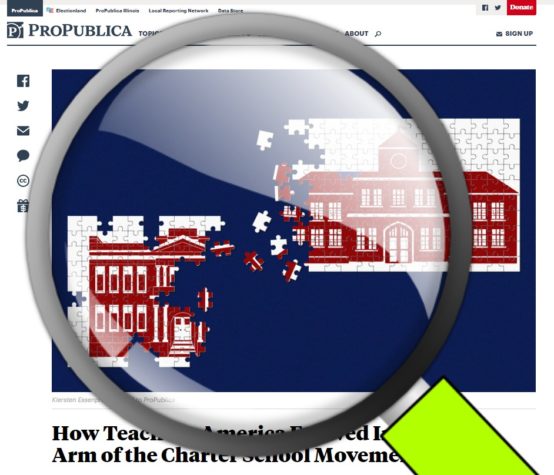How ProPublica’s investigation of Teach For America fell flat
By Alexander Russo
Last week’s most hotly debated education article was the 5,500-word ProPublica story, How Teach for America Evolved Into an Arm of the Charter School Movement, which described Teach for America’s supposed metamorphosis into a tool of the Walton Family Foundation and the charter school movement.
It’s clear that reporter Annie Waldman and her editors spent time and energy reporting the story. Over the past decade, ProPublica has produced an enormous amount of award-winning journalism. Just last year, Waldman co-wrote an excellent story about racial segregation in Charlottesville with the New York Times’ Erica Green.
However, this is not an example of the careful and widely admired work usually associated with ProPublica.
The central finding — that TFA has become an “arm” of the charter school movement — is under-supported by the provided evidence and assumes that coordination between these groups is problematic. The information provided in the piece is overwhelmingly critical of TFA and charter schools, without documenting any negative effects other than teacher attrition. The piece also features a handful of nagging inaccuracies and omissions that undercut readers’ confidence in what they’re being told.
It’s an investigation that stumbles on some of the most basic facts. It’s a hit piece rather than a fair-minded look into TFA’s evolution. It’s a “gotcha” story that doesn’t really get anybody.
Disclosure: The Grade’s funders have included the Walton Foundation, the American Federation of Teachers, the National Alliance of Public Charter Schools, the Gates Foundation, and others.

Last week’s ProPublica article.
There are a handful of nagging issues that mar the piece from the start, detracting from the credibility that is normally associated with ProPublica’s journalism.
For example, the claim that TFA was started to address teacher shortages is ridiculous to anyone who was following the early days of the organization (or remembers the state of education during the 1990s).
The notion that nonunion charters have “gained acceptance” in recent years would seem to be contradicted by leading 2020 Democratic presidential candidates who are taking every opportunity to criticize them. (See yesterday’s Washington Post story, Democrats abandon charter schools as ‘reform’ agenda falls from favor.)
And the accusation that TFA tried to block its members from participating in teacher strikes has been questioned by several knowledgeable observers (who suggest that the prohibition against activism is actually a longstanding policy of the federal AmeriCorps program).
However, the main problem with the piece is that its central conclusion isn’t supported by the reporting.
Charter schools are publicly funded, privately run schools that usually lack labor contracts for teachers and typically serve kids regardless of school attendance area.* Once considered a bipartisan innovation to help kids not being well-served by district schools, they are now considered suspect in some liberal circles (especially white ones).
Teach For America is a non-traditional teacher recruitment and placement program that provides abbreviated teaching training and does not require a traditional education major. Like charter schools, it was once considered a bipartisan way of addressing teacher quality issues that has since fallen somewhat out of favor.
The big reveal of the ProPublica story is that in 2013 the Walton foundation gave TFA a two-year $20 million grant to recruit teachers for districts experiencing high levels of charter growth — and gave a financial priority to charter school teacher placements over district hires.
“Documents obtained by ProPublica show that the Walton foundation, a staunch supporter of school choice and Teach for America’s largest private funder, was paying $4,000 for every teacher placed in a traditional public school — and $6,000 for every one placed in a charter school,” Waldman writes.
The story presents a secondary piece of evidence that 40 percent of TFA teachers are hired by charter schools, while only seven percent of students in the U.S. attend them.
For charter school critics, these details may seem damning. They are certainly presented as such.
But neither of those facts prove that anything nefarious is going on. TFA and charter schools tend to be clustered in regions with enormous unmet educational needs. Non-traditional public schools are attracting teachers from a non-traditional teacher recruitment program. An education foundation in favor of these approaches supported the effort. The fact that the grant in question is so small and expired so long ago just highlights the weakness of the case that’s been made.
Sign up here for a free newsletter featuring the week’s best education news and newsroom comings and goings.

Three ProPublica staffers involved with this story: President Richard Tofel, reporter Annie Waldman, and senior editor Daniel Golden.
Inadequate support for its central thesis is not the only major issue with the piece.
While lengthy and far-reaching in the anecdotes it gathers to string together its case, the ProPublica piece is overwhelmingly negative, especially when it comes to issues that are particularly important to parents and educators of color.
TFA and the Walton foundation are given the opportunity to respond to criticism —a minimal standard for a piece of journalism.
There are one or two concessions to the value of the program sprinkled here and there, including a TFA teacher who likes the program and appreciates teaching at a charter school, and occasional lines like this that stick out like a sore thumb:
“Whichever type of school they serve in, Teach For America’s teachers devote their intelligence and energy to helping low-income and minority students and closing the nation’s unrelenting achievement gap.”
But that’s about it.
While the piece goes to great lengths to explore concerns about teacher preparation and retention, it fails to credit to TFA for diversifying the pipeline of classroom teaching candidates, ignores charter schools’ role in providing school options for millions of low-income and nonwhite families, and fails to inform readers that charter schools have long been considered a “boogeyman” for teachers unions.
To learn more about how the media covers education, follow The Grade on Twitter and Facebook.

On Friday, ProPublica released this statement
This is just the latest in a long line of stories about TFA and charter schools, which I’d argue receive too much media attention given the enormous structural problems of the traditional system.
Sad to say, this piece isn’t telling us all that much that’s new. It’s simply amplifying already well-known critical narrative about non-district schools and non-traditional teacher training programs.
And so the response was predictably polarized. Critics of TFA and charter schools applauded the story for amplifying their view of the world, while school reform allies noted the glaring inaccuracies and curious omissions. (One critic called it “a rambling mess.”)
On Friday ProPublica put out a statement defending the story’s accuracy, declaring that the piece is “both accurate and fair,” and claiming that the outlet was unaware of any challenges to the facts of the story or requests for a correction.
This was an unfortunate and mysterious response, given the many questions raised regarding factual accuracy on Twitter over the past few days. But it’s not all that unusual. Corrections are enormously difficult for newsrooms to concede. ProPublica does not have a public editor.
The sad thing is that there is a story about TFA’s evolution that’s very worth telling. Now nearly 30 years old, the organization has gone through a series of changes to address concerns about diversity and accountability and to reflect its members’ resurgent interests in social justice. In the process, the organization has alienated some of its staunchest supporters.
Crossed fingers someone will write that story. In the meantime, the half-baked ProPublica version of events is already being absorbed into the media mainstream. On Sunday, NPR’s Weekend Edition ran a segment about the ProPublica piece, including some of the most obvious misstatements from the original story.
*Correction: Due to an editing error, the original version of this piece failed to note that some charter school teachers do have labor contracts.
PREVIOUS COLUMNS
The New York Times wrote a big story about online learning in Kansas. It didn’t go well.
A cautionary tale about linking school choice and segregation
How a Teach For America-inspired journalism program aims to bolster local news coverage
Rocky start for ProPublica ‘alternative schools’ series
Shut up about Harvard (and TFA, and charters, and school closings)
What the Hechinger Report misses about disproportionately white charter schools
NPR’s deeply unbalanced profile of Rocketship Charter Schools
ABOUT THE AUTHOR

Alexander Russo
Alexander Russo is founder and editor of The Grade, an award-winning effort to help improve media coverage of education issues. He’s also a Spencer Education Journalism Fellowship winner and a book author. You can reach him at @alexanderrusso.
Visit their website at: https://the-grade.org/












